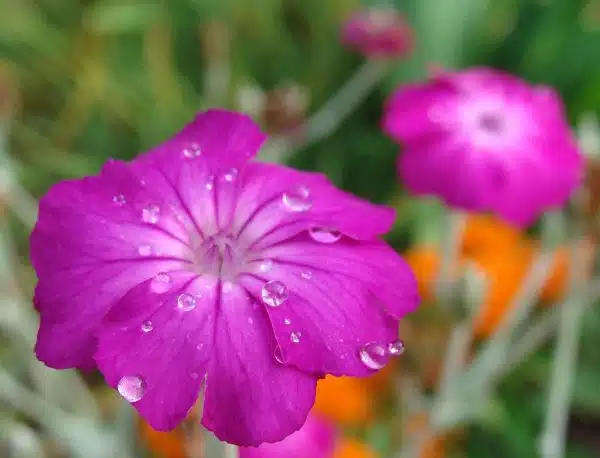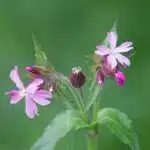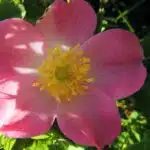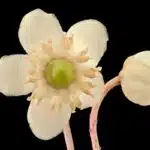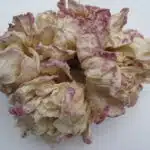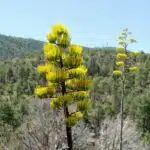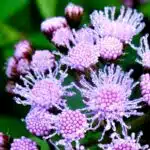Rose campion (Lychnis coronaria) is a beautiful and versatile plant that belongs to the family of Caryophyllaceae. This herbaceous perennial is native to southern Europe but has spread throughout the world due to its ornamental value. Rose campion is popular for its bright magenta or pink flowers that bloom from late spring to early summer, and its silvery-grey foliage that adds a unique texture and contrast to any garden.
If you’re looking for an easy-to-grow plant that will thrive in various conditions and provide an attractive display, then rose campion might be just what you need. In this article, we’ll discuss how to grow and care for rose campion, including its preferred growing conditions, propagation methods, pests and diseases, and tips for maintaining healthy plants. Whether you’re a seasoned gardener or just starting out, this guide will give you all the information you need to cultivate vibrant rose campion in your backyard or front porch.
Overview Of Rose Campion
Rose campion is a unique and stunningly beautiful plant that belongs to the Campion varieties. It is known for its silver-green foliage, which creates a striking contrast against its magenta-pink blooms. This plant is native to southern Europe and thrives in regions with hot and dry summers, making it perfect for arid gardens.
To grow rose campion successfully, it is essential to understand its best growing conditions. These plants prefer full sunlight exposure and well-draining soil with a pH between 6.5 and 7.5. They can tolerate drought but require moderate watering during prolonged dry periods to prevent wilting. Additionally, they benefit from regular deadheading to prolong blooming.
Understanding plant needs is crucial when caring for rose campion. As aforementioned, these plants thrive in hot and dry conditions; therefore, they do not tolerate high humidity levels or excessively moist soils. Overwatering can lead to root rot or fungal diseases, which can be detrimental to the health of the plant. In the next section, we will delve deeper into how to provide the appropriate care for rose campion based on specific plant needs.
Understanding Plant Needs
To successfully grow and care for rose campion, it is important to understand the plant’s needs. This involves conducting research on various aspects such as soil type, light requirements, water needs, and plant growth stages. Research helps in identifying the most ideal conditions for the plant to thrive and produce beautiful blooms.
Understanding plant growth stages is crucial in providing appropriate care for rose campion. The plant goes through different stages of growth including germination, vegetative, flowering, and seed production. Each stage requires specific care such as optimal lighting conditions, watering frequency, fertilization schedule, and pruning techniques. Providing the right care at each growth stage enhances the overall health and vigor of the plant.
In addition to research and understanding plant growth stages, it is essential to regularly monitor the plant’s health status. This involves checking for pests and diseases that may affect its growth or cause damage to its foliage. Early detection of problems enables prompt action that can prevent further damage or even save the entire crop. By following these guidelines on understanding plant needs, one can cultivate a thriving rose campion garden that will be admired by all.
| Plant Needs | Ideal Conditions | Maintenance |
|---|---|---|
| Soil Type | Well-drained sandy loam soil with a pH range of 6-7 | Amend soil with organic matter annually |
| Light Requirements | Full sun to partial shade (4-6 hours of direct sunlight daily) | Rotate plants every two years |
| Water Needs | Regular watering during dry spells; Avoid overwatering or waterlogging soil | Apply mulch around plants to conserve moisture |
| Fertilization Schedule | Apply balanced fertilizer during planting; Top dress annually in springtime. | Prune damaged branches or deadhead flowers regularly |
Transition: Understanding how rose campion grows is just one aspect of successful cultivation. Another critical factor is choosing the right soil for optimal growth.
Choosing The Right Soil
Understanding the needs of plants is crucial to their growth and development. Just like humans, plants require certain conditions to flourish. These conditions include adequate light, water, nutrients, and well-drained soil. Rose campion is a beautiful flowering plant that requires special attention when it comes to soil.
Choosing the right soil is essential for growing rose campion successfully. The plant prefers well-drained soil that doesn’t hold water for too long. Improving drainage is crucial for rose campion as it prevents root rot and other fungal diseases. Adding amendments such as sand or perlite will help improve drainage in heavy soils.
Apart from improving drainage, adding organic matter to the soil can also benefit rose campion greatly. Organic matter helps retain moisture in the soil while also providing nutrients necessary for healthy growth. Compost or well-rotted manure can be added to the soil before planting or as a top dressing during the growing season to supply these vital nutrients.
In summary, choosing the right soil for rose campion involves improving drainage and adding amendments such as sand or perlite. Additionally, incorporating organic matter into the soil can provide essential nutrients needed for healthy growth. In the next section, we will discuss how watering and fertilizing play a role in maintaining healthy rose campion plants.
Watering And Fertilizing
Watering and fertilizing are two key aspects of rose campion care that contribute significantly to the plant’s health and growth. Watering frequency depends on various factors, including soil type, weather conditions, and plant age. In general, young plants require more frequent watering than mature ones. During hot summer months, it is crucial to water the plants regularly to prevent drought stress.
When it comes to fertilizers, there are two main types: organic and synthetic. Organic fertilizers are derived from natural sources like animal manure or compost, while synthetic ones are chemically manufactured. Both types have their advantages and disadvantages. Organic fertilizers release nutrients slowly over time, providing a steady supply of nutrients to the plants. They also improve soil quality by increasing its organic matter content. On the other hand, synthetic fertilizers provide an immediate nutrient boost but can lead to nutrient imbalances if not used correctly.
To ensure healthy growth and development of rose campion plants, it is essential to choose an appropriate fertilizer based on soil condition and plant needs. It is also crucial to follow the manufacturer’s instructions for application rates and frequency. Over-fertilization can damage the plant’s roots and cause leaf scorching or burn.
In terms of watering and fertilizing practices for rose campion plants, striking a balance between too much or too little is critical for optimal growth and development. The next step in caring for these beautiful plants involves understanding their sun and shade requirements.
Sun And Shade Requirements
Sun exposure is one of the most important factors to consider when growing rose campion. This plant thrives in full sun, which means it needs at least six hours of direct sunlight per day. In areas with hot climates, partial shade may be necessary to prevent the plant from getting too much sun. However, it is important to note that partial shade can lead to weaker stems and fewer blooms.
When choosing a location for your rose campion, it is essential to consider its growing conditions. The soil should be well-draining and nutrient-rich, as this plant prefers slightly alkaline soil with a pH level between 6.0 and 7.5. Additionally, regular watering is necessary during the first few weeks after planting to help establish the roots. After that, the plant will require less water but still needs consistent moisture.
To ensure that your rose campion receives adequate sunlight, you may need to adjust its position throughout the day or provide some form of shading during peak hours. If you live in an area with extreme heat or intense sunlight, it may be best to grow your rose campion in a container so you can move it into a shadier spot as needed. Overall, providing proper sun exposure and growing conditions will help your rose campion thrive and produce beautiful blooms year after year.
As we have learned about sun exposure requirements for rose campion plants, the next step in caring for them is propagation by seed.
Propagation By Seed
Germination process for rose campion seeds is relatively easy and straightforward. The best time to start the seeds is in early spring, after the last frost date has passed. Before planting, soak the seeds in water for 24 hours to help soften their hard outer shell. After soaking, plant the seeds in a well-draining soil mix, covering them with about 1/8 inch of soil. Keep the soil consistently moist but not waterlogged and place them in a warm spot with plenty of light.
Seed starting tips can help ensure a successful germination process. It’s important to use fresh seed as older seed may have lower germination rates. Additionally, avoid planting too deeply or burying the seeds as they require light to germinate. To provide extra moisture retention, cover the container with plastic wrap until sprouts appear. Once sprouts emerge, gradually increase air circulation by removing the plastic wrap for longer periods each day.
Overall, propagation by seed is an easy and cost-effective way to grow more rose campion plants. With proper care and attention during the germination process, you can enjoy a beautiful display of these lovely flowers in your garden or landscape without breaking the bank. In the next section, we will discuss another method of propagating rose campion – propagation by division – which involves dividing mature plants into smaller sections for transplanting into new areas of your garden or sharing with friends and family who also love gardening!
Propagation By Division
Ah, the joy of gardening – nothing quite compares to the satisfaction of watching plants grow under your care. For those who have mastered the basics of rose campion cultivation, propagation by division is an exciting next step. Not only does it provide a chance to increase your plant stock, but it also promotes healthier growth and ensures that each plant gets the space it needs.
Benefits of division are many – first and foremost, it helps to maintain the health and vigor of your rose campion plants. Overcrowded clumps can lead to stunted growth and poor flowering, so dividing them every few years will allow for better air circulation and light penetration. Additionally, propagating via division enables gardeners to create multiple new plants from a single parent plant, which is a cost-effective way to expand one’s garden or share with friends.
Timing for dividing plants is crucial – ideally, this should be done in early spring or late summer when temperatures are mild and soil moisture levels are consistent. This allows time for the roots to establish before winter sets in or before hot weather arrives. Begin by carefully digging up the entire clump and gently separating it into sections using a clean sharp knife or spade. Each section should have healthy roots attached along with several stems and leaves.
Next up is transplanting and repotting, which will be covered in detail in our next section. But first, let’s focus on mastering propagation by division – not only is it a fun challenge for experienced gardeners but also a great opportunity for beginners to learn more about their beloved rose campion plants. With proper timing and technique, you’ll soon be able to enjoy an abundance of colorful blooms in your garden!
Transplanting And Repotting
Transplanting and repotting are crucial steps in the growth and care of rose campion. The best time to transplant rose campion is during its dormant period, which occurs in the late fall or early spring. Signs of readiness for transplanting include the plant outgrowing its container or becoming root bound.
Tools and techniques for successful transplanting include a sharp garden spade, a shovel, and a pair of gardening gloves. Begin by digging around the root ball and loosening the soil. Carefully remove the plant from its current container or soil location, taking care not to damage any roots. Place the plant in its new location and add fresh soil around it, making sure to water it well.
In the next section on pruning and deadheading, we will discuss how to maintain healthy growth and appearance of your rose campion plants. With proper transplanting techniques, your plants will have a solid foundation for continued growth and thriving health.
Pruning And Deadheading
After successfully transplanting and repotting rose campion, the next crucial step in ensuring its growth and care is pruning and deadheading. Pruning is the act of cutting back the plant to promote new growth, while deadheading refers to removing spent flowers to stimulate continued blooming. These techniques help maintain the health and aesthetic appeal of rose campion.
Pruning techniques for rose campion vary depending on the desired outcome. For a fuller, bushier plant, it is recommended to cut back one-third of its height in early spring before new growth appears. This will encourage branching and more upright growth. On the other hand, if a taller plant with fewer but larger flowers is preferred, pruning should be done only after blooming has finished in late summer or early fall.
Deadheading benefits rose campion by preventing seed production which can divert energy from flower production. It also maintains a tidy appearance as spent blooms can detract from the plant’s beauty. Deadheading should be done regularly throughout the growing season by removing individual spent flowers or cutting back entire stems to just above a healthy leaf node. With proper pruning and deadheading, rose campion will continue to produce vibrant blooms throughout its growing season.
As with any plant, rose campion is susceptible to pests and diseases that can affect its health and appearance. In the next section, we will discuss common issues that may arise when caring for this beautiful species and how to address them effectively.
Common Pests And Diseases
Rose campion is a hardy and resilient plant, but it can still fall victim to various pests and diseases if not properly cared for. One of the most common pests that attack rose campion is aphids. These tiny insects suck the sap from the leaves and stems, causing them to wilt and deform. To prevent an infestation, gardeners should regularly inspect their plants for signs of aphids and remove any affected parts immediately. Additionally, introducing beneficial insects like ladybugs or lacewings can help control aphid populations.
Another common pest that affects rose campion is spider mites. These tiny arachnids feed on the sap of the leaves, causing yellowing and stippling. They also produce fine webs that can cover the entire plant, leading to stunted growth and eventual death. Preventative measures include keeping the soil moist and ensuring adequate air circulation around the plant. Organic treatments like neem oil or insecticidal soap can also be effective at controlling spider mite populations.
Diseases like powdery mildew or rust can also affect rose campion if proper care isn’t taken. Powdery mildew appears as a white, powdery substance on the leaves while rust presents as orange spots on the underside of leaves. To prevent these diseases from taking hold, gardeners should ensure their plants have adequate sunlight and airflow. Pruning infected parts of the plant can also help prevent further spread. If necessary, organic treatments like copper fungicide or sulfur powder can be used to treat these diseases without harming beneficial insects or other plants in the area.
Transition: While preventative measures are essential in keeping pests and diseases at bay, there are also natural pest control methods that gardeners can use to maintain healthy rose campion plants.
Natural Pest Control Methods
Common pests and diseases can pose a significant threat to the growth and health of rose campion. However, there are natural pest control methods that gardeners can use to maintain their plants’ well-being without harming the environment. These methods include planting companion plants and attracting pollinators.
Companion planting involves growing certain plant species together for mutual benefits, such as repelling pests or improving soil quality. For rose campion, some effective companions include lavender, yarrow, and catmint. These plants not only deter harmful insects but also attract beneficial ones like bees and butterflies that help with pollination. Additionally, they enhance the aesthetics of the garden by adding color and texture.
Attracting pollinators is another way to control pests naturally while improving the overall health of rose campion. By providing a habitat for bees, butterflies, and other pollinators through planting nectar-rich flowers and avoiding pesticide use, gardeners ensure that these beneficial insects will visit their gardens regularly. Pollinators help to increase fruit set in plants while reducing pest damage by feeding on insect larvae or eggs. In turn, rose campion thrives as it receives adequate pollination from these helpful creatures.
Transition: Although natural pest control methods are best for maintaining healthy roses campions, chemical pest control methods are still available for those who need them.
Chemical Pest Control Methods
Rose campion is a hardy plant that can withstand most pests and diseases. However, in some cases, chemical pest control methods may be necessary to protect your plant. Before using any chemical pesticides, it is important to consider the environmental impact of these products. Many conventional pesticides are toxic to pollinators and other beneficial insects, which can have a negative impact on the overall health of your garden ecosystem.
Organic alternatives are often a safer option for controlling pests on rose campion. These methods include using neem oil or insecticidal soap to repel or kill pests. Another effective method is companion planting, which involves planting other plants nearby that help repel pests naturally. For example, planting marigolds or chrysanthemums near rose campion can help deter aphids and other common pests.
When considering chemical pest control methods, it is important to use caution and follow all safety instructions on the label. Always choose products that are specifically labeled for use on rose campion and follow the recommended application rates carefully. If possible, try organic alternatives first before resorting to chemical pesticides.
Transition: While chemical pest control methods can be effective in some cases, there are also natural ways to protect your rose campion from pests and diseases. One such method is companion planting – let’s explore this further in the next section.
Companion Planting
Chemical pest control methods are common, but they come with their risks. These methods involve the use of synthetic chemicals that can harm beneficial insects and pollinators, as well as contaminate soil and water. Companion planting is a natural and effective way to control pests while promoting biodiversity in the garden.
Companion planting involves growing different plants together that complement each other’s growth and discourage pests. For instance, planting marigolds near rose campion can help keep aphids at bay. Similarly, planting cilantro near tomatoes can repel whiteflies. The benefits of intercropping go beyond pest control; it also improves soil health by increasing microbial activity and nutrient cycling.
To reap the benefits of companion planting, it’s important to choose plants that have complementary growth habits, nutrient requirements, and pest-repelling properties. Some popular companion plants include basil, dill, chamomile, and yarrow. It’s also essential to rotate crops every season to prevent soil-borne diseases from building up. With careful planning and management, companion planting can be an effective way to grow healthy plants without relying on chemical pesticides.
Tips for success in companion planting include researching which plants work well together before planning your garden layout. Additionally, it’s crucial to pay attention to plant spacing and not overcrowd your garden beds. Finally, regular monitoring for pests is necessary so that you can take action early on if needed. By using this natural method of pest control in your garden with rose campion or any other plant species, you’ll be supporting a healthier ecosystem while still enjoying a bountiful harvest.
Tips For Success
Soil preparation for rose campion should include well-draining soil that is relatively low in fertility. Watering should be done frequently, but not with too much water, as this can cause root rot. Pruning should be done when the plant begins to look leggy, and should be done lightly to keep the plant from becoming overgrown. To promote healthy growth, rose campion should be fertilized with a balanced fertilizer every two weeks during the growing season.
Soil Preparation
To ensure the success of your rose campion, it is crucial to start with proper soil preparation. One key factor to consider is the soil pH level. Rose campions thrive in slightly acidic soil with a pH range between 6.0 and 7.0. Therefore, before planting, it is recommended to test your soil’s pH level and make necessary adjustments by adding lime to raise the pH or sulfur to lower it accordingly.
Another important aspect of soil preparation is organic matter content. Rich soil with high organic matter content provides essential nutrients for healthy plant growth and development. To improve the organic matter content of your soil, incorporate compost or well-rotted manure during the soil preparation process. This will not only benefit your rose campion but also improve the overall health of your garden.
In conclusion, proper soil preparation is vital for growing healthy and vibrant rose campions. By ensuring that your soil has the correct pH level and organic matter content, you can set the foundation for a successful growing season. Remember to test your soil’s pH level prior to planting and incorporate compost or well-rotted manure for optimal results. With these tips in mind, you can enjoy beautiful blooms from your rose campion year after year.
Watering
Proper watering is also essential for the success of your rose campion. This plant requires moderate watering, which means that it needs enough moisture to thrive but not so much that its roots become waterlogged. Watering frequency will depend on factors such as the climate, soil type, and plant size. However, as a general rule, it is recommended to water once or twice a week during the growing season.
When watering your rose campion, be sure to use proper techniques to avoid damaging the plant. It is best to water at the base of the plant rather than overhead to prevent wetting the leaves and flowers. Wet foliage can increase the risk of fungal diseases and sunscald. Additionally, avoid using high-pressure sprays as they can damage delicate foliage.
In addition to proper frequency and techniques, it is also crucial to monitor your rose campion’s water needs regularly. Factors such as temperature changes and rainfall patterns can affect how much water your plant requires. Therefore, it is essential to pay attention to signs of underwatering or overwatering and adjust accordingly. By providing adequate moisture through proper watering practices, you can ensure healthy growth and vibrant blooms from your rose campion.
Frequently Asked Questions
Benefits of Rose Campion
Rose campion, also known as Lychnis coronaria, is a beautiful flowering plant that can add an elegant touch to any garden. Its silver-grey leaves and vibrant pink, magenta or white flowers bloom in early summer and last until late autumn. Apart from its aesthetic appeal, rose campion is a useful plant that attracts pollinators such as bees and butterflies to your garden. Additionally, rose campion is deer-resistant, which makes it ideal for gardens located in areas with deer populations.
Best Time for Planting Rose Campion
If you are planning on planting rose campion in your garden, the best time to do so is in early spring or fall. This way, the plant will have enough time to establish itself before the winter frost or summer heat sets in. Before planting, ensure that the soil is well-drained and has a pH level of 6.0-7.0. Rose campion prefers full sun but can tolerate partial shade.
Caring for Rose Campion
Rose campion requires minimal care once established. Water the plant deeply once a week during dry spells and fertilize it with organic compost or slow-release fertilizer in the spring. Deadheading faded flowers regularly will encourage more blooms throughout the season. In winter, cut back any dead stems to promote new growth in spring. By following these simple steps, you can enjoy the beauty of rose campion in your garden year after year without too much effort.
In summary,
Rose campion is a beautiful flowering plant that provides various benefits to your garden such as attracting pollinators and being deer-resistant. The best time for planting this lovely addition to your garden is early spring or fall when there’s enough time for it to establish itself before harsh weather conditions set in. Once established, caring for rose campion requires minimal effort by watering it once a week during dry spells and fertilizing it with organic compost or slow-release fertilizer in the spring. Deadheading faded flowers regularly will encourage more blooms throughout the season, and cutting back dead stems in winter can promote new growth in the spring. By following these simple steps, you can enjoy the beauty of rose campion in your garden for years to come.
Frequently Asked Questions
Can Rose Campion Be Grown In Containers?
Container gardening has become increasingly popular among green-thumbed enthusiasts. It’s a great way to bring life and color to small spaces or add some zest to an existing garden. The soil type is crucial when considering container gardening, as it directly affects the growth and health of the plants. When it comes to growing rose campion in containers, the soil must be well-draining and rich in nutrients. As a horticulture writer, I highly recommend using a high-quality potting mix that contains perlite or vermiculite for optimal drainage. Remember, successful container gardening requires attention to detail and plenty of TLC. So roll up your sleeves and get ready to serve your plants with care!
How Long Does It Take For Rose Campion To Bloom?
The blooming period of Rose Campion may vary depending on several factors like pruning techniques, soil quality, and weather conditions. Typically, Rose Campion blooms in late spring or early summer and continues to flower until fall. Proper pruning techniques such as deadheading spent flowers and removing diseased stems can promote more blooms. However, common pests and diseases like aphids, spider mites, rusts, and powdery mildew can affect the blooming period of Rose Campion. It is crucial to detect these problems early on and take appropriate measures to prevent their spread.
What Is The Ideal Temperature Range For Rose Campion?
Rose campion is a hardy plant that can tolerate a wide range of temperatures but prefers moderate to warm climates. The ideal temperature range for this species is between 60 and 85 degrees Fahrenheit, making it suitable for planting in most regions. However, extreme heat or cold can be detrimental to the growth and flowering of rose campion. It is important to consider the climate suitability of the area before planting this species as it thrives best in well-drained soils and full sun exposure. Proper care and maintenance will ensure that rose campion blooms consistently and adds color to any garden or landscape.
Can Rose Campion Tolerate Drought Conditions?
Rose campion is a drought-tolerant plant that can withstand long periods of time without water. Its ability to conserve water makes it an excellent addition to gardens and landscapes in arid regions. The plant is able to survive in such conditions due to its deep root system, which allows it to tap into water sources deeper in the soil. Gardeners looking for a low-maintenance plant that requires less watering will find rose campion an ideal choice. In addition, the water conservation properties of this plant make it an environmentally-friendly option for those looking to reduce their water usage.
Is Rose Campion Toxic To Pets Or Humans?
Rose campion, also known as Lychnis coronaria, is a popular garden plant due to its striking appearance and ease of care. However, concerns regarding its toxicity to pets and humans have been raised. While there are no reported cases of rose campion being toxic to humans, it can cause mild allergies and sensitivities in some individuals. On the other hand, the plant contains saponins that can be toxic to pets such as cats and dogs if ingested in large amounts. To avoid any potential harm, it is important for pet owners to keep their furry friends away from this plant or supervise them while playing in the garden.
Conclusion
Rose Campion, a lovely addition to any garden, is a hardy perennial that is easy to care for. It can be grown in containers or directly in the ground with well-draining soil and full sunlight. This plant blooms in early summer and continues through the fall, with stunning pink, purple or white flowers atop tall stems. The ideal temperature range for Rose Campion is between 60-80°F (15-27°C), making it perfect for most climates.
This plant can tolerate drought conditions but prefers regular watering during dry spells. It is also important to note that Rose Campion is not toxic to pets or humans, making it a safe option for households with children and animals.
In conclusion, growing Rose Campion is an excellent way to add color and beauty to your garden. With its hardy nature, stunning blooms, and versatility in growing conditions, this plant is sure to delight any gardener. So why not give it a try? Plant some Rose Campion today and enjoy the alluring allure of its magnificent flowers!
Image Credits
- “Rose campion, with raindrops, SOOC” by Martin LaBar (featured)

